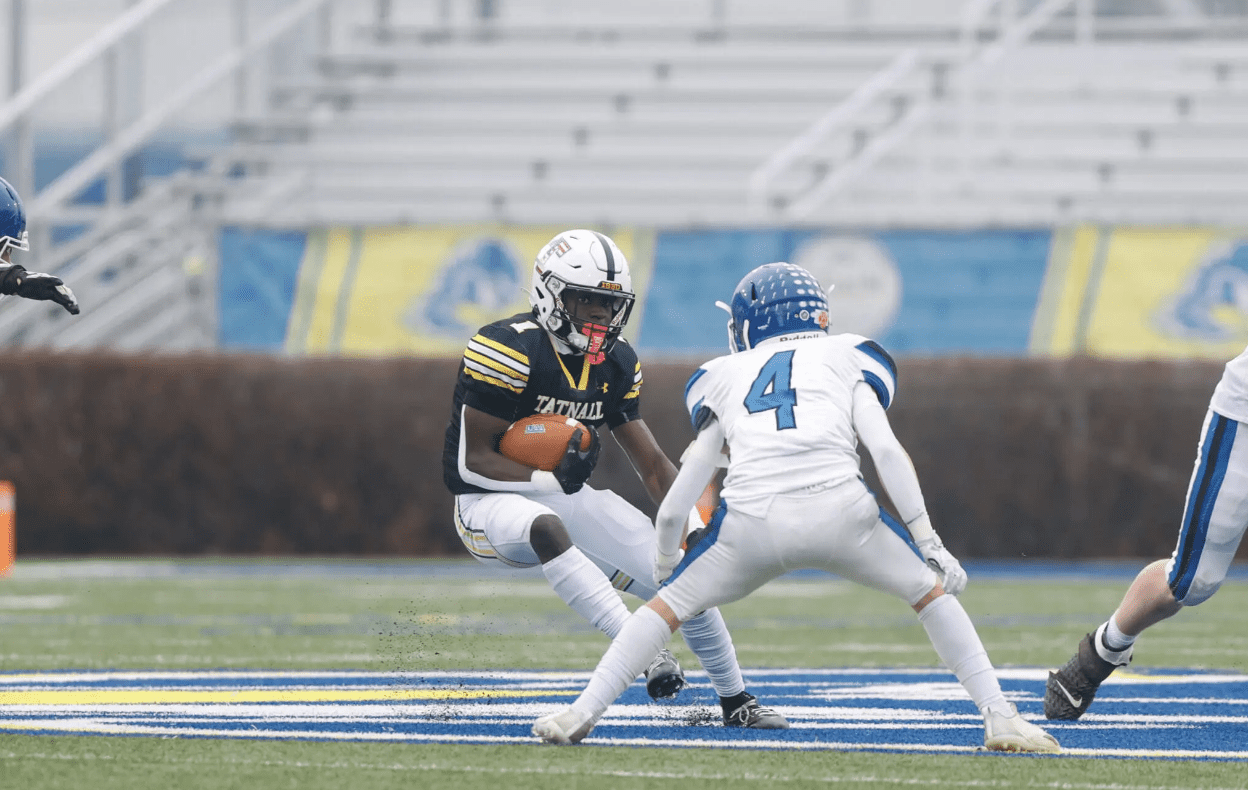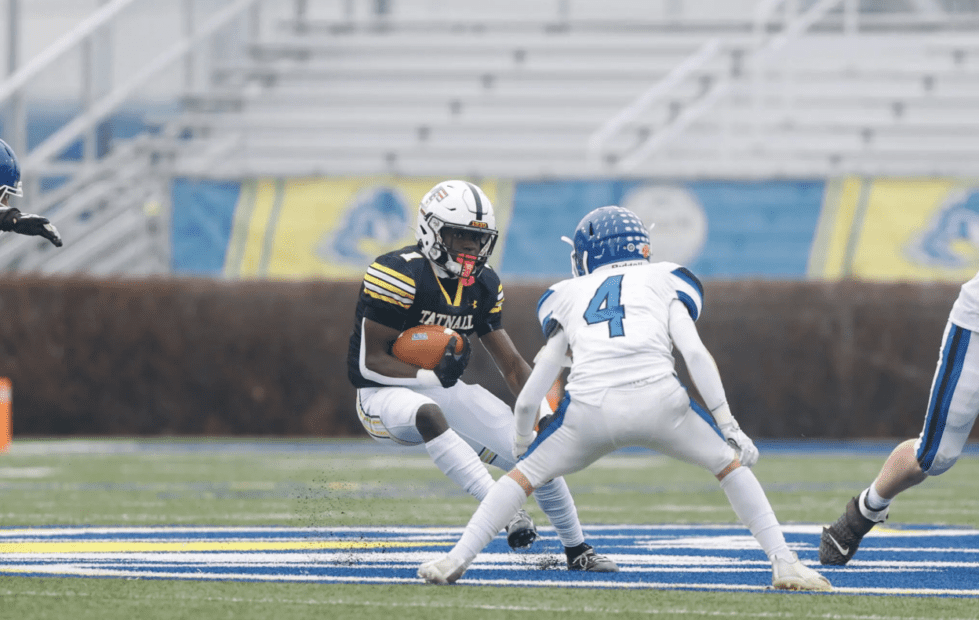
A proposed bill would alter DIAA’s process for accepting and reviewing waivers for potential student-athlete transfers. (Photo by Nick Halliday)
The emergence of the transfer portal has drastically changed the landscape of college sports in the past few years, notably making it difficult for coaches to recruit and maintain players.
Now, the same idea of athletes transferring schools has made its way into the high school level, and a new bill by the Delaware General Assembly aims to smooth the process.
Senate Bill 281, sponsored by Sen. Nicole Poore, D-Delaware City, makes changes based on the findings of the Delaware Interscholastic Athletic Association (DIAA) Task Force.
The task force, over the last eight months, studied and made recommendations to best address the needs of student athletes and ensure DIAA’s effective and efficient functioning.
SB 281, which was discussed in a Senate Education Committee hearing Wednesday, addresses one of the identified issues: the waiver process when a student transfers from one school to another and wishes to play interscholastic athletics.
Old rule
Under current regulations, a student who transfers schools and wishes to participate in sports must complete a period of ineligibility unless the student meets certain conditions or qualifies for an exception.
In order to meet the conditions or exception or otherwise request a waiver of ineligibility, the student must go through a waiver process, in which the student applies for a waiver, DIAA’s executive director makes an interim decision on the waiver, and the DIAA Board of Directors ratifies or rejects the executive director’s interim decision.
If the board has any questions about any part of the waiver application or interim decision, they reject the interim decision and schedule a hearing for the student to testify to answer the additional questions.
By the time the board issues a final decision on the waiver, the student has lost time to play sports and the board has spent a great deal of its meeting time on the hearing, including going into executive session to maintain a student’s privacy, Poore said.
New rule
Under the bill, the executive director would make the final decision on a waiver, subject to an appeal of a three-member panel of board members.
The executive director must issue their decision within 15 days of receiving a waiver, and a student may appeal the decision to the appeals panel within 15 days of receiving the decision.
The appeals panel must issue its decision within 30 days of receiving an appeal, and it can’t hold a hearing on an appeal or otherwise ask questions of a student who seeks an appeal.
Rather, the panel must make its decision based on the documentation that the executive director used to make their decision.
“The athletes might want to transfer to be able to have that opportunity, whether they’re a good player or not a good player, and everybody fits somewhere,” Poore said. “Sometimes it is the location of the school, it could also be that someone has not been successful in the school that they’re in, or for health reasons they need to make that change.”
But, Poore added, the bill contains guardrails to make sure students aren’t just jumping schools and having the ability to immediately pick up where they left off.
In NCAA College Football, legendary head coach Nick Saban, who won a record seven national championships as a head coach – six at Alabama and one at LSU – noted the challenges of the transfer portal as a reason he suddenly retired in January.
“So if you jump from playing football for school A, and then basketball season comes around and you go to school B to play basketball for their team because they’re the better team than your school team, and then baseball season comes around and you jump to school C to play for that school, that’s what we’re trying to prevent right now,” said David Baylor, the current executive director for the DIAA.
Baylor cited that the NCAA’s “wild west” transfer portal undermines the importance of academics to a student athlete.
“If that were allowed to come down to the high school level, just think of what we’re doing to the young student, in terms of developing them to be a good student first and then potentially a good athlete later,” he said.
Sen. Laura Sturgeon, D-Hockessin and committee chair, said she isn’t on the pulse of high school sports, and wanted to know what else the DIAA is trying to prevent with transfers.
“How is it fair to the kid at school B, who’s been a part of that team from the ninth grade on up, has been that every practice, has gone to classes, passed their classes, on the road to graduating, and then a person comes in and bumps them out of their opportunity to participate,” Baylor said.
Sturgeon joked that she did not realize that K-12 athletics “was such a cutthroat world.”
Under SB 281, a student is subject to a period of ineligibility of 30 days or ½ of the maximum number of contests, whichever is less, for each interscholastic athletic sport in which the student participated during the previous 180 school days, if either of the following apply:
- The student has already transferred schools at least 1 time. A student like this is not eligible to participate in the interscholastic athletic sport’s post-season.
- The student transfers after the earliest allowable start date of the fall interscholastic athletic sport season of the student’s third year of eligibility at the high school level.
A period of ineligibility would begin on the receiving school’s first day of competition for the relevant interscholastic athletic sport.
To calculate the maximum number of contests, the DIAA would round down to the nearest whole number if the number of contests is not divided evenly.
The receiving school of a student who qualifies for immediate eligibility must initiate the completion of a tracking form, to document the transfer and reason for immediate eligibility.
“There is a player or two on some of those teams which has benefited from a lax transfer rule,” said Sen. Eric Buckson, R-Dover, who was a former educator and coach for decades. “Adding one key player to [a team] changes a lifetime, not just for that player, but for the players on his team and the teams that he beat and the team that he left or she left.”
He said sports are not a right, they’re an extracurricular, and if it were a right, there wouldn’t be cuts and everyone would make the team and play.
“But that’s not how sports operates, sports are a lifetime lesson,” he said. “It teaches you that you have to figure it out, and sometimes life isn’t fair, but you have to keep going. If things aren’t going in this direction, the way you want to, change directions and figure it out and you’ll be okay.”
He said not everyone’s personal stories should be accommodated with relaxed transfer rules.
Senate committees do not take a public vote, rather they sign the back of the bill which will be posted on the General Assembly website tracker, typically within a couple of hours.
Also in the hearing, Senate Bill 280, sponsored by Poore, makes a technical change based on the findings of the DIAA Task Force.
Under the bill, the DIAA board would select and hire an executive director to work in collaboration with the Department of Education.
The executive director is an employee of the department and receives compensation commensurate with the department’s salary scale at the director level, rather than the education associate level.
If released by committee, both bills would make their way to the full Senate floor for debate.

Raised in Doylestown, Pennsylvania, Jarek earned a B.A. in journalism and a B.A. in political science from Temple University in 2021. After running CNN’s Michael Smerconish’s YouTube channel, Jarek became a reporter for the Bucks County Herald before joining Delaware LIVE News.
Jarek can be reached by email at [email protected] or by phone at (215) 450-9982. Follow him on Twitter @jarekrutz
Share this Post




